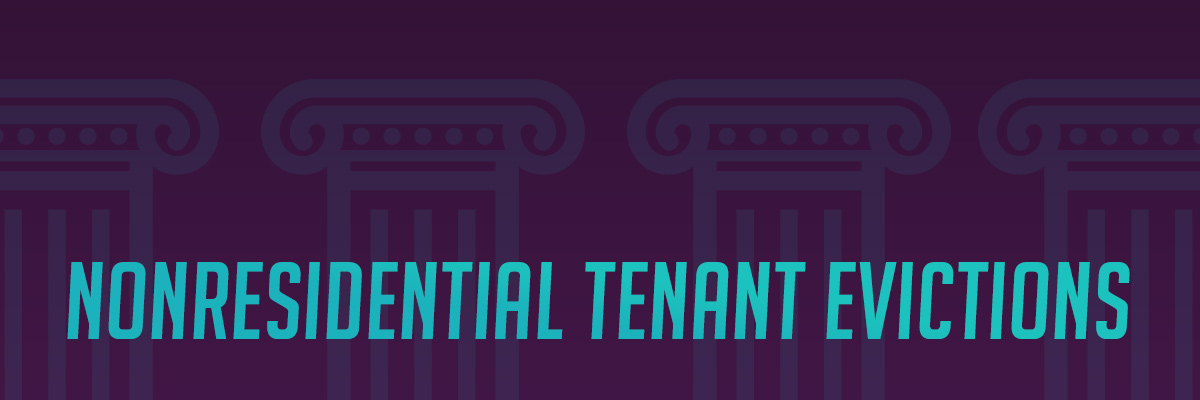Nonresidential Tenant Evictions
May 16, 2023

When dealing with a tenant who has failed to pay rent or who breaches a term of the lease, you have likely heard terms such as “5-Day Notice” and “21/30 Notice.” However, these notices typically apply to residential leases controlled by the Virginia Residential Landlord Tenant Act (VRLTA). What happens if a commercial tenant either fails to pay rent or breaches a term in a commercial lease agreement?
Commercial leases or nonresidential tenancies are not controlled by the VRLTA, but instead by Virginia Code sections 55.1-1400 through 55.1-1428. A “nonresidential tenancy” is “the rental of any real estate for purposes other than residential use, including business, industrial, or agricultural purposes.” (VA Code § 55.1-1400.)
In a commercial lease, the terms of the contract control, and only if the contract is silent does the Code apply. (VA Code § 55.1-1400.B.) Therefore, if your commercial lease agreement requires certain notice periods before a landlord can terminate a lease due to a breach by the tenant, then those notice periods would control. However, if the lease is silent on that issue, then the Virginia Code applies.
Virginia is one of only a handful of states that still allows commercial landlords to utilize self-help evictions with the caveat that the self-help eviction cannot create a “breach of the peace.” (Id.) A self-help eviction occurs when a landlord takes back possession of a property by actions such as changing the locks or shutting off utilities. While self-help is lawful, it may cause more problems than it solves. For example, if you change the locks on a tenant who is running a business, and as a result, the tenant cannot access personal property, there could be a claim for theft or a claim for interrupting the tenant’s business. If there is any doubt as to whether the tenant actually breached the lease agreement and the owner is entitled to possession, self-help is likely not a smart route.
Even though self-help eviction is an option, commercial landlords can still pursue “termination of any commercial or other nonresidential tenancy by the filing of an unlawful detainer action, entry of an order of possession, and eviction . . . .” (Id.) Going through the court procedure of an unlawful detainer action is a much less risky option because the court issues a judgment confirming the tenant breached the lease and that the owner is entitled to possession.
You might also like…
“Can cooperative compensation be a condition of the buyer-broker agreement?”
By Ryan Leonard - July 24, 2024
*Please note: Any questions regarding Legal Hotline Spotlights should be submitted via the Virginia REALTORS® Legal Hotline. Our attorneys are unable to respond to questions through our comments section. Q:… Read More
Your Guide to Tenant Confidentiality According to the VRLTA
By Jon Haley - July 17, 2024
Keeping information received from tenants and prospective tenants confidential is one of your most important responsibilities as a property manager. Luckily, the VRLTA provides a pretty thorough list… Read More
“A home I’m listing borders land where a mixed-use development is planned. As a dual agent, must I disclose this?”
By Sean Olk - July 15, 2024
*Please note: Any questions regarding Legal Hotline Spotlights should be submitted via the Virginia REALTORS® Legal Hotline. Our attorneys are unable to respond to questions through our comments section.… Read More